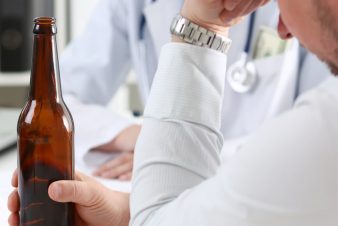Addiction Treatment
What is Addiction?
Addiction is Complicated But It can be Understood and Overcome
Learn the signs and get help in LA
What Is the Definition of Addiction?
Daily Support
Our team is on-site 24/7 to provide support when you need it.
Private Facility
In the heart of California’s gorgeous San Fernando Valley.
Addiction Awareness
Verify your insurance, it may cover the cost of treatment
In just a few minutes, we’ll give you perspective of how your insurance may help with your recovery from addiction. Even if you don’t see your insurance providers logo here, you may still be eligible for coverage.
Fill out the secure form and we will contact you with clarity about your insurance coverage.
What Are the Symptoms, Signs, and Behaviors?
Most symptoms, signs, and behaviors of addiction involve an inability to manage self-control. Addiction or drug use signs and behavior may include possible changes that are:
Behavioral
Being secretive, drastic changes in personal relationships, hiding from friends or family
Social
Problems at work or school, disinterest in daily activities, looking for situations that encourage drug use
Mental
Sleeplessness, memory loss, anxiety, depression, sadness
Physical
Lack of energy and motivation, weight loss or gain, red eyes, neglected appearance
Financial
The sudden need for more money, requests for money without reasonable explanation, missing cash or items
Symptoms and emotional changes related to addiction
Some symptoms and emotional changes related to addiction:
Blame
Addiction can make a person become obsessed with a substance, putting all their time, energy, and money into finding a way to continue to get it. Letting their lives fall to the wayside, they tend to blame other factors and people for their problems
Dependency
In many cases, dependency is an inability to stop using. It gives the user unrealistic judgments on what the substance is doing for them.
Risky Behavior
It is common for someone with an addiction to have increased sensitivity and more harsh reactions in situations. They may take risks they wouldn’t have before to get the substance or while under the influence.
Denial
Many people with substance use disorders are not aware they are addicted or dependent on a substance. Some people that are aware of their addictions refuse to accept the need for treatment.
Frequently asked questions about Addiction
What Causes Addiction?
Addictive substances can cause a rush of intense pleasure and have substantial effects on the brain. These intoxicated feelings create euphoria and fill the brain with rewarding feelings, activating a release of dopamine, a brain neurotransmitter tied to feeling pleasure. The National Institute of Health’s research has revealed brain imaging studies in humans that show activation of dopamine during alcohol and other substance use, including nicotine. Dopamine is a critical regulator of learning, motivation, energy, attention, and time, which allows an influential reinforcement association with substance consumption and happiness. As time passes with continuous substance use, addiction will be more challenging to put a stop to because natural rewarding behaviors become less satisfying.
Addiction and the Brain
Substance abuse changes brain structure and function, beginning with recognizing pleasure and ending with a tendency for impulsive behavior to regain that pleasure. All addictive substances cause a particularly potent release of dopamine in the nucleus accumbens, the region known as the brain’s pleasure center. According to Harvard Health, addictive drugs can release two to ten times the dopamine amount that natural rewards do. They cut a corner straight to the brain’s “reward circuit,” known as the basal ganglia brain region, by overloading the pleasure center with dopamine. This shortcut plays a significant role in the addiction cycle by trumping the brain’s pleasure and reward system.
Addiction to a substance affects the entire human brain, but certain brain regions play an especially important role in addiction. After substance use rewards the brain, the amygdala brain region stores positive associations of pleasure with that substance to help create a conditioned response—these acquired responses from the brain aid in creating a craving. Continuous use of an addictive substance causes the brain’s prefrontal cortex’s involvement, controlling impulses and stimulating habits by the motivation of the rewarding stimulus that started the addiction cycle.
The Addiction Cycle
Addiction is a repetitive cycle with three stages associated directly with drug use in three brain regions, the basal ganglia, the extended amygdala, and the prefrontal cortex. With effective addiction treatment, the addiction cycle stops at the last stage. In cognitive behavioral therapy, successful management of the executive function, the impulsive control in cognitive behavior, controls your ability to make the right choices not to use a substance when urged or triggered, is addressed.
The three stages of addiction are:
Binge / Intoxication:
This stage significantly involves the basal ganglia, the brain’s “habit circuitry,” because along with dopamine activation, it plays a crucial role in producing rewarding feelings that substance use creates.
Withdrawal / Negative Affect:
During this stage, there is a decrease in the brain’s reward system function. Through withdrawal, which includes negative emotions, the extended amygdala activates the brain’s stress systems.
Preoccupation / Anticipation:
This stage of addiction engages the prefrontal cortex part of the brain, characterized by an interruption of the executive function. The prefrontal cortex region controls the executive function, the capacity to organize thoughts, prioritize, manage time, and regulate one’s actions and emotions.
Is Addiction Genetic?
How Does Addiction Affect Family?
The struggle of addiction is a burden that the whole family feels. Family holds the answer to how addictions form, maintain, and positively influence the disorder’s treatment. Therefore treating only the person with the disease is restricted in how successful recovery can be. Family members feel the devasting impacts of addiction, sometimes ignoring the family unit to support change. Families can heal, but no family member can be left untreated.
Can You Fully Recover from Addiction?
Feedbacks & Reviews
Patient experiences
Our facility
About Northridge Addiction Treatment Center
We believe that recovery is more than just sobriety; it is an opportunity for a fresh start in life.
NATC is a premier luxury facility nestled in the Los Angeles Valley, surrounded by California’s breathtaking beaches and mountains. Our exclusive twelve-patient capacity ensures a tranquil, open environment where you can focus on healing not just from addiction, but on restoring your well-being. We offer our residents the choice of semi-private accommodations, with private rooms available upon request for added comfort.
Addiction Treatment Programs at NATC
Our luxury facility provides numerous amenities that focus on your comfort, while our medical team and support staff focus on your individualized care.

Drug types
Medical Detox
Our main objectives during medical detox are comfort and safety to foster our resident’s confidence in a lasting recovery after a successful detox.
- Alcohol
- Benzos
- Opioids
- Stimulants

Treatment Types
Residential Treatment
Our luxury facility places high importance on a peaceful and healing environment for deep introspection to address the addiction source, not merely the substance use, for effective and beneficial treatment.

Medically Assisted
Dual Diagnosis
NATC uses integrated treatment, acknowledging both disorders’ relation and core causes to equip you with the foundation to control your mental health without substance use.
